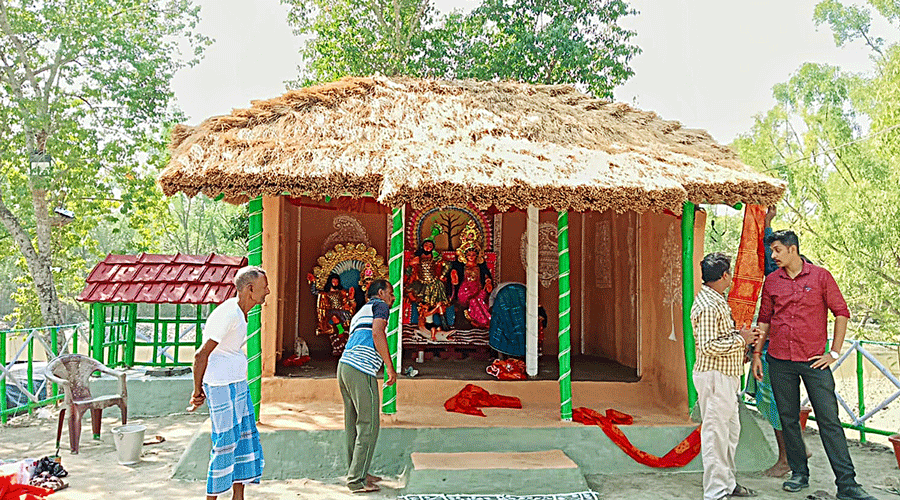Family members of animal attack victims in the Sunderbans have demanded the abrogation of the British-era boat licensing certificate system and the inclusion of those attacked by animals in the state government’s compensation network.
The plea comes before chief minister Mamata Banerjee arrives at Kalitala in Hingalganj, North 24-Parganas, on Tuesday to offer prayer at a temple of Goddess Bonbibi, the presiding deity of people living in the Sunderbans.
Led by the Sunderbans Tiger Widow Welfare Society, a social organisation based in Gosaba, animal attack victims and their family members have also appealed to the government in a letter for the creation of alternative job opportunities in the delta so that people are not compelled to enter the forest and get killed by tigers.
The society in its letter also demanded coverage of animal attack victims under the state government’s Sasthya Sathi scheme.
Every year, around 40 persons die in tiger attacks in the Sunderbans, which consists of 54 small islands spanning the districts of North 24-Parganas and South 24-Parganas. People living in this terrain have very few livelihood opportunities and a sizeable number of them risk their lives by entering the delta to catch fish and crabs. These apparently “lucrative” ventures often end up in villagers losing lives or getting grievously injured in tiger attacks.
An official of the tiger widow welfare society has said most of those “ventures for livelihood” become illegal because of a permit system that the British government introduced in 1923 to facilitate the transportation of timber by traders from forests to the mainland by boats.
Even though the “Certificate of Registration and Measurement of Boats” has become redundant with a complete ban on cutting down trees in the Sunderbans, the state government is yet to withdraw it permanently. Although new licenses are not being issued, the existing ones are renewed for an approximate annual fee of Rs 15,000.
“This has hurt poor fishermen who cannot afford to pay high fees,” said a member of the society.
“The forest department issues these permits only to non-motorised boats. As the permit is costly, rich boat owners buy it and illegally rent out the certificate in exchange for money every season. In this process, fishermen who can shell out money enter the forests legally. In case of tiger attacks, these legal entrants become eligible for compensation. However, most of the people entering the creeks of the Sunderbans illegally often become victims of tiger attacks and are left out of the government compensation scheme,” said Ashim Gyne, secretary of the welfare society.
The society alleged that the “permit raj” was being illegally used by politically influential businessmen having no link with the Sunderbans to extort fishermen.
“At present, there are 924 active licensees in the delta whereas around 1.5 lakh people depend on fishing for their livelihood,” said a member of the society.
A fisherman, who risks his life to catch crabs in the delta, said it was not possible for poor people like him to buy certificates for anything between Rs 40,000 and Rs 50,000 every season. “If we could afford this amount every year, we wouldn’t have risked our lives,” he said.
Admitting that the licensing system was being illegally exploited by a section of the people, divisional forest officer (South 24-Parganas) Milan Kanti Mondal said the forest department could do very little to scrap it. “It is a policy matter of the government that involves several departments,” he said.
Sources claimed most crab hunters risked tiger attacks because of the “returns”. A three-day crab hunt venture helps a fisherman earn around Rs 30,000, they said.











